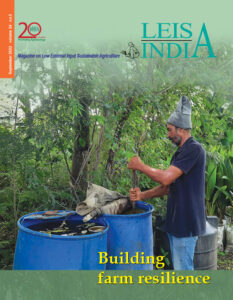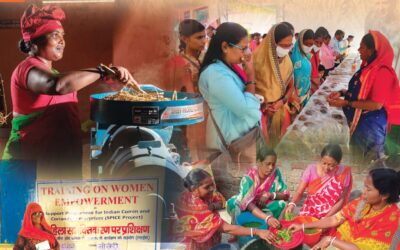
We have come a long way on the path of development, which we can be proud of. But development comes with a huge cost in terms of its effect on environment, climate and communities. Farmers, already a vulnerable lot, become more vulnerable when they have to deal with the aberrations in climate, markets and life in general. It is important to strengthen their adaptive capacities and find ways to deal with such situations and become resilient.
Farm resilience is not just about specific technology, like the drought or flood resistant varieties, or is it about a package like ‘climate smart farming’. It is also about building capacities of farmers, building social capital, recognising traditional knowledge and reducing dependency on external inputs and so on. A self reliant farm is also a resilient farm. In this issue, you can find several examples where communities are encouraged to practise farming with low external inputs and include diversity, to build farm resilience. The support of external agencies and policy support, however play a crucial role.
Also, in the changing climate and market scenario, some innovative farmers are exploring ways to deal with vulnerabilities and are leading change rather than feeling as victims of change. They are serving as role models adopting methods of farming which are in sync with nature and motivating others to follow. They are the hope for the present and future of farming and the environment.
Hope you find this issue interesting. While we await your feedback, we also request you to continue to support the programme, as before.
4. Editorial
6. De-risking agriculture – Women-led climate resilient farming model
Upmanyu Patil
11. Building resilience organically
Harshal Khade
15. Resilience of local communities – Lessons from Covid-19
17. In the news
19. Building Farm Resilience through Natural Farming – Reflection from Field
M. Manjula, V Manikandan and Divya Sharma
24. For Mekong Delta farmers, diversification is the key to climate resilience
28. New Books
29. Sources
30. Enhancing resilience of flood affected communities
Archana Srivastava and Bijay Prakash
33. Resilient farming – The one-acre model
B M Sanjana







